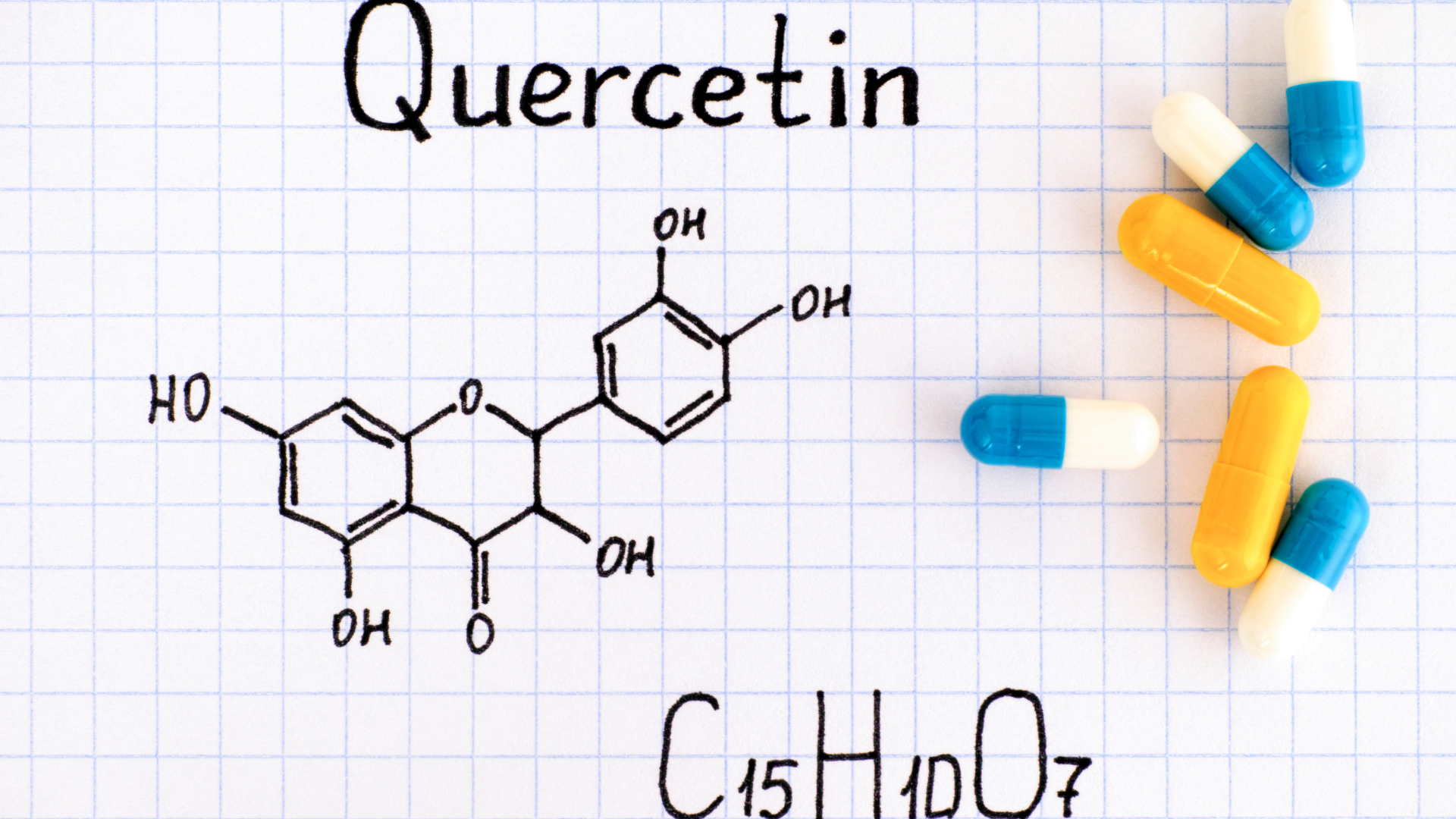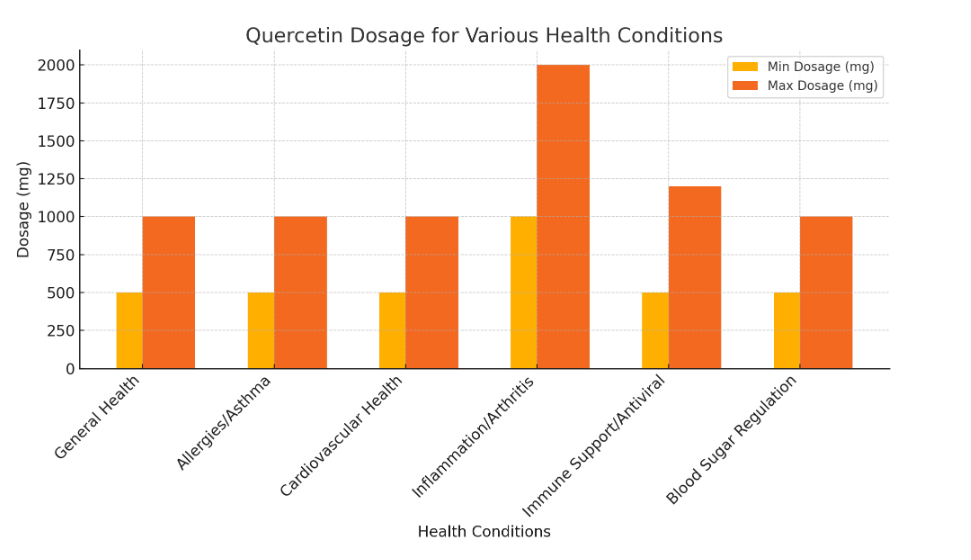
Quercetin is a bioflavonoid, a type of polyphenolic compound, found in plants. Often referred to as a “plant pigment,” it is responsible for the vibrant colors in many fruits and vegetables. As a potent antioxidant, quercetin plays a critical role in neutralizing free radicals, which are unstable molecules that can harm cells and contribute to chronic diseases and the aging process.
By reducing oxidative stress, quercetin helps protect the body from cellular damage, inflammation, and even degenerative diseases.Its anti-inflammatory and antiviral properties further enhance its health benefits, making it widely used in supplements and natural remedies. [1]
Natural sources of quercetin include Fruits (Apples, citrus fruits, grapes, cherries, and berries (especially cranberries and blueberries), Vegetables (Red onions, kale, spinach, broccoli, and peppers), Grains: Buckwheat, Herbs: Capers and dill are also rich in quercetin.
Quercetin is present in Miduty Immune Shield within the range of 700 mg per serving.
Miduty Immune Shield supplement has 60 servings per container with the health expert recommending consumption of 2 capsules daily together with 1 multivitamin capsule. This supplement is focused on countering health conditions and plays its role in allergy relief, cardiovascular health, anti-inflammatory support, or enhanced immunity.
Miduty’s Immune Shield combines Liposomal Quercetin with other immune-boosting ingredients such as Bromelain and Stinging Nettle. With enhanced bioavailability, it ensures your body can effectively use these nutrients to provide relief and support.
The liposomal form used in Miduty Supplements is much easier on the digestive system. This makes it suitable for individuals with sensitive stomachs or those prone to digestive issues.
It also helps by reducing inflammation and improving immune response, it helps the body fend off infections and illnesses more effectively. It’s particularly helpful during periods of low immunity, offering robust support when your body needs it most.
| Benefits |
Description |
|
Anti-Inflammatory Properties |
Quercetin is known for its potent anti-inflammatory effects. It helps inhibit the production of inflammatory mediators like prostaglandins and leukotrienes, which can contribute to chronic inflammation.[2] This is particularly beneficial for individuals with conditions such as arthritis, where inflammation plays a significant role in pain and mobility issues. By reducing inflammation, quercetin may alleviate symptoms and improve the quality of life for those affected. |
| Allergy Relief |
As a natural antihistamine, quercetin plays a crucial role in managing allergy symptoms. It works by stabilizing mast cells, preventing them from releasing histamine, which is responsible for allergic reactions such as sneezing, itching, and nasal congestion.[3] Research suggests that quercetin can be particularly effective during pollen season, helping individuals who suffer from seasonal allergies find relief without the drowsiness often associated with conventional antihistamines. |
| Heart Health |
Quercetin has been linked to improved cardiovascular health through various mechanisms: [4] Blood It may help lower blood pressure by improving endothelial function, which enhances blood vessel flexibility. Quercetin can help lower LDL cholesterol (often referred to as "bad" cholesterol) levels, reducing the risk of heart disease. By neutralizing free radicals, quercetin protects the heart and blood vessels from oxidative damage. |
| Immune System Support |
The antioxidant properties of quercetin boost the immune system by protecting cells from oxidative stress and enhancing immune response. Studies have shown that quercetin can reduce the severity and duration of colds and other upper respiratory infections. Its ability to modulate immune cell activity helps in managing inflammation and promoting a balanced immune response, making it beneficial during cold and flu seasons. [5] |
| Blood Sugar Regulation |
Quercetin may help regulate blood sugar levels, which is crucial for individuals with diabetes or those at risk. It appears to improve insulin sensitivity and may reduce the absorption of glucose in the intestines. Some studies suggest that quercetin can lower fasting blood glucose levels and improve metabolic health, making it a potential ally for managing blood sugar. [6] |
| Exercise Performance |
Athletes and fitness enthusiasts may benefit from quercetin due to its potential to enhance exercise performance. Research indicates that it can reduce oxidative stress induced by strenuous exercise, helping to minimize muscle soreness and fatigue. [7] Additionally, quercetin may improve endurance by increasing the body’s capacity to utilize oxygen during physical activity, thus promoting better performance. |
| Cancer Prevention |
Preliminary studies suggest that quercetin may have anticancer properties. It has been shown to inhibit the proliferation of cancer cells and induce apoptosis (programmed cell death) in certain types of cancer. [8] Quercetin’s ability to reduce oxidative stress and inflammation may also contribute to its potential protective effects against various cancers, although more research is needed to fully understand its mechanisms. |
| Neuroprotective Effects |
Quercetin may help protect brain health by reducing oxidative stress and inflammation in neural tissues. This is particularly important for preventing neurodegenerative diseases such as Alzheimer’s and Parkinson’s. Some studies suggest that quercetin can enhance cognitive function, improve memory, and support brain health by mitigating the effects of age-related decline. [9] |
The adequate dosage of Quercetin can vary depending on age, health status, and specific needs.
General Adult Dosage: Typically, 500 mg to 1,000 mg per day for general health. Best taken in divided doses (e.g., 500 mg twice daily).
Pregnancy and Breastfeeding: Not recommended during pregnancy or breastfeeding.

Specific Health Conditions:
With or After Meals: Quercetin is fat-soluble, meaning it’s better absorbed when taken with meals that contain healthy fats (e.g., avocados, nuts, or olive oil). Taking it with food also helps minimize digestive discomfort, such as nausea or upset stomach.
For Immune Support: Whether you're using quercetin for immune support or its antiviral benefits, make it part of your daily routine during cold and flu season or when facing potential exposure to infections.
Before Exercise: Quercetin may improve endurance and reduce inflammation, so athletes or active individuals can benefit from taking it 30-60 minutes before exercise.
Interactions: Quercetin can alter how the body processes antibiotics, reducing their effectiveness. Since quercetin can affect blood clotting, it may interfere with medications like warfarin. It may interact with certain cancer treatments, so cancer patients should consult their oncologist before taking quercetin.
Common Side Effects: Quercetin is generally considered safe for most people when consumed in food or supplement form. However, high doses of quercetin supplements can cause side effects such as Headaches, Stomach upset or nausea, and Tingling sensations.
Kidney Safety: Very high doses of quercetin (above 2,000 mg daily) may cause potential harm to the kidneys. It’s important to stay within recommended dosage ranges.
Stay Hydrated: Drink plenty of water to reduce the likelihood of gastrointestinal side effects.
Quercetin is a powerhouse flavonoid with numerous health benefits, ranging from anti-inflammatory effects to supporting heart health and immunity. Whether used for allergy relief, reducing inflammation, or boosting exercise performance, quercetin is a versatile compound.
Miduty’s Liposomal Quercetin and Immune Shield supplements offer enhanced bioavailability, ensuring maximum absorption and effectiveness. By incorporating quercetin-rich foods or supplements into your routine, you can tap into its powerful antioxidant, immune-supporting, and anti-inflammatory properties while minimizing the risk of side effects.
Remember to stay within the recommended dosage and consult with a healthcare professional if you have any underlying conditions.
